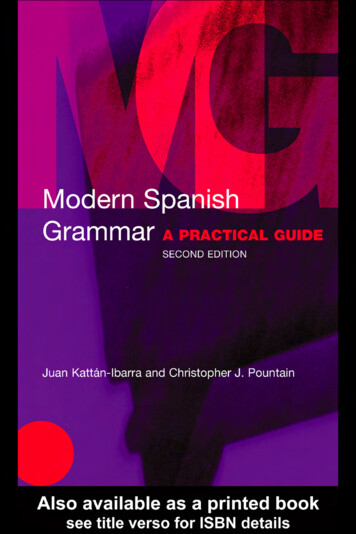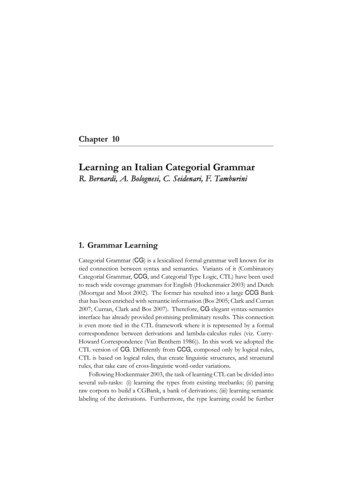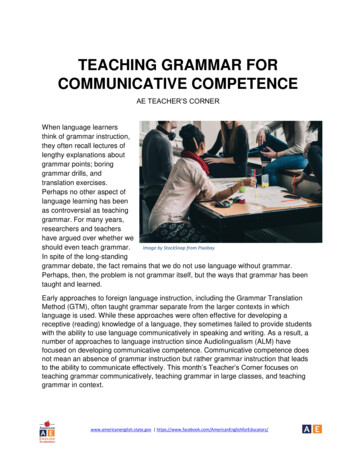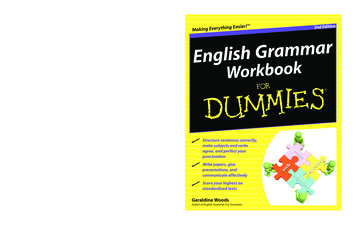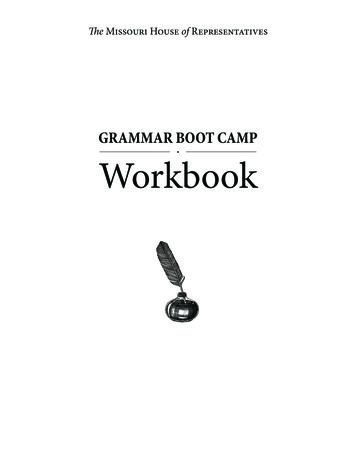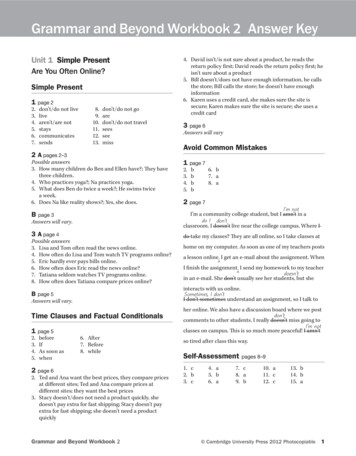
Transcription
Grammar and Beyond Workbook 2 Answer KeyUnit 1 Simple PresentAre You Often Online?Simple Present1 page 22.3.4.5.6.7.don’t/do not livelivearen’t/are o not goaredon’t/do not travelseesseemiss2 A pages 2–3Possible answers3. How many children do Ben and Ellen have?; They havethree children.4. Who practices yoga?; Na practices yoga.5. What does Ben do twice a week?; He swims twicea week.6. Does Na like reality shows?; Yes, she does.B page 3Answers will vary.3 A page 4Possible answers3. Lisa and Tom often read the news online.4. How often do Lisa and Tom watch TV programs online?5. Eric hardly ever pays bills online.6. How often does Eric read the news online?7. Tatiana seldom watches TV programs online.8. How often does Tatiana compare prices online?Answers will vary.Time Clauses and Factual Conditionals2.3.4.5.beforeIfAs soon aswhen3 page 6Answers will varyAvoid Common Mistakes1 page 72.3.4.5.bbbb6. b7. a8. a2 page 7I’m notI’m a community college student, but I amn’t in ado I don’tclassroom. I doesn’t live near the college campus. Where Ido take my classes? They are all online, so I take classes athome on my computer. As soon as one of my teachers postsa lesson online I, get an e-mail about the assignment. When I finish the assignment , I send my homework to my teacher doesn’tin an e-mail. She don’t usually see her students, but sheinteracts with us online.Sometimes, I don’tI don’t sometimes understand an assignment, so I talk toB page 51 page 54. D avid isn’t/is not sure about a product, he reads thereturn policy first; David reads the return policy first; heisn’t sure about a product5. Bill doesn’t/does not have enough information, he callsthe store; Bill calls the store; he doesn’t have enoughinformation6. Karen uses a credit card, she makes sure the site issecure; Karen makes sure the site is secure; she uses acredit card6. After7. Before8. while2 page 62. T ed and Ana want the best prices, they compare pricesat different sites; Ted and Ana compare prices atdifferent sites; they want the best prices3. Stacy doesn’t/does not need a product quickly, shedoesn’t pay extra for fast shipping; Stacy doesn’t payextra for fast shipping; she doesn’t need a productquicklyGrammar and Beyond Workbook 2her online. We also have a discussion board where we postdon’tcomments to other students. I really doesn’t miss going toI’m notclasses on campus. This is so much more peaceful! I amn’tso tired after class this way.Self-Assessment pages 8–91. c2. b3. c4. a5. b6. a7. c8. a9. b10. a11. c12. c13. b14. b15. a Cambridge University Press 2012 Photocopiable1
Unit 2 Present Progressiveand Simple PresentBrainpowerPresent Progressive1 page 102.3.4.5.are studyingare sendingis producingis growing6. are making7. are improving8. are exercising2 pages 10–11Possible answers2. Is Yesenia eating breakfast; Yes, she is.3. Is Yesenia walking to work?; Yes, she is.4. Is Yesenia watching TV in the evenings?; No, she isn’t.5. Is Yesenia doing crossword puzzles?; Yes, she is.6. What’s/What is Yesenia doing before bed?; She’sbrushing her teeth.3 page 112.3.4.5.6.7.8.9.I am learning Portuguese.Glenn and Bruce are writing with their opposite hands.Greg is driving on a different road to work.Ingrid and I are playing board games.Natalya is studying yoga and meditation.Luis is playing Bingo these days.Dustin and Sharon are reading a lot more.We are enjoying our new hobbies.2 page 132.3.4.5.iswantis lookingis thinking6.7.8.9.knowswantsbelieveloveAvoid Common Mistakes1 page 132.3.4.5.baaa6. b7. a8. b2 page 14behavingAre you behave differently than you normally do? Areyou experiencing sudden changes in mood now? Are youDo you wanthaving trouble with decisions? Are you wanting someoneelse to make decisions for you? If you answer yes to theseisquestions, maybe your memory getting worse. Doctors arethinkthinking a few simple changes in lifestyle can help improveiseatingyour memory. It working for Joe Jones. These days, he is eatismore fruit and vegetables. He sleeping more than before.enjoyingAlso, he is enjoing life more. He often connects with friendson social networking sites. He is 63 years old, and his brainand body are in excellent condition.4 page 12Answers will vary.Self-Assessment pages 14–15Simple Presentand Present Progressive Compared1. c2. b3. c1 A page 122.3.4.5.6.is learningspeakwanttalksuses7.8.9.10.11.are gettingsingssingis readingagreeB pages 12–13Possible answers2. She speaks Spanish to Sofia.3. What does Diego speak to Sofia?4. Paula and Diego are getting her ready for bed.5. What does Diego often do?6. She is reading Sofia a story in Spanish.7. Do scientists agree that these are good ways for childrento learn two languages?Grammar and Beyond Workbook 24. a5. b6. b7. c8. a9. c10. a11. c12. b13. a14. c15. cUnit 3 ImperativesWhat’s Appropriate?Imperatives1 page 163.4.5.6.DressDon’t/Do not forgetBeListen7.8.9.10.Don’t/Do not chewAskThankSend Cambridge University Press 2012 Photocopiable2
2 page 172. B efore your child uses the site, talk about cyberbullyingwith him or her.3. When your child posts a photo, check that it doesn’tshow personal information.4. If you are worried about your child’s safety, buy an appthat monitors him or her.5. When your child reads gossip, explain that gossip canhurt people.6. If you see something inappropriate on your child’spage, talk to your child about it.phone on vibrate. Some professors allow drinks in class,do notbut donot eat in the classroom. Finally, if you are not sure ifdon’ta behavior is appropriate for the classroom, dont do it. Askthe professor before or after class if it is OK.Self-Assessment pages 20–211. b2. c3. c4. a5. c6. b7. a8. c9. b10. b11. a12. a13. c14. a15. b3 page 17Answers will vary.Unit 4 Simple PastEntrepreneursLet’s . . .1 page 182. let’s not arrive3. Let’s wrap4. Let’s use5. Let’s not forget6. Let’s eat2 page 182.3.4.5.6.7.8.9.10.Let’s find a site for our blog.Let’s read the blog site’s guidelines.Let’s write an entry every week.Let’s take turns responding to comments.Let’s not make grammar or spelling mistakes.Let’s check comments for inappropriate language.Let’s not give personal information.Let’s make a survey for the blog.Let’s not write entries that are too long.Avoid Common Mistakes1 page 192.3.4.5.bcab6. c7. a8. b2 page 19American college students often behave very informally.do notHowever, donot think that there are no rules in collegeLet’sclassrooms. Lets remember these suggestions for a positiveDon’texperience in your classes. Dont come late to class. If youcan’t get to class on time, change to a different class time.do notAlso, donot leave the classroom before class is over. If youDon’thave to leave, tell your teacher beforehand. No talk whilethe professor is talking. Your classmates want to hearDon’tthe lecture and the instructions for any assignments. NoSimple Past1 page 22Regular Verbs2.3.4.5.design; designedemploy; employedmove; movedstart; startedIrregular Verbs2.3.4.5.begin; beganfind; foundget; gotgo; went2 page 222.3.4.5.attendedgraduateddid; studymajored6. study; studied7. try; tried8. work; worked6. leave; left7. meet; met8. teach; taught6. changed7. didn’t/did not like8. wanted3 page 233. How old were they?; They were 12 and 15 years old.4. Where did they live?; They lived in Denver, Colorado.5. Did Elise and Evan sell to family and friends?; Yes, theydid.6. Did Elise design the company website?; No, she didn’t.Simple Past of Beand There Was / There Were1 page wasweren’twasanswer your cell phone in class. Remember to put your cellGrammar and Beyond Workbook 2 Cambridge University Press 2012 Photocopiable3
2 A pages 24–252.3.4.5.6.B2.3.4.5.there werethere wasthere wasthere werethere weren’tUnit 5 Simple Past, Time Clauses,Used To, and WouldScience and Society7. There were8. there wasn’t9. there wasTime Clauses and the Order of Past Eventspage 251 page 28Was there; Yes, there was.Were there; No, there weren’t.Were there; Yes, there were.Was there; Yes there was.2. she thought of ideas, she wrote them down3. she talked to her friends, she wrote about her idea4. she described her idea to friends, she got feedback fromthem5. She thought of a name for her invention; she wrote theinstructions for making it6. She searched for similar ideas on the Internet; sherealized that her idea was uniqueAvoid Common Mistakes1 pages 25–262.3.4.5.bbca6. c7. a8. b2 page 292 page 26grewTelevision personality Rachael Ray grow up aroundfood. Her family owned several restaurants in Cape Cod,workedMassachusetts, and later her mother works as a foodsupervisor for some restaurants in upstate New York.Rachael also had several jobs in the food industry. One jobwas in a gourmet grocery store in Albany, New York. Shebuynoticed that people didn’t bought many groceries becausewantthey didn’t wanted to cook. They were working people, andwasn’tthere weren’t enough time in their busy day for cooking.Rachael started cooking classes. In these classes, Rachaelcooked meals in thirty minutes. The classes were veryin 1999In 1999, sheorpopular. She wrote in 1999 her first cookbook . Therewerewas many more cookbooks after that. The cookbooks werepopular because the recipes were quick and easy to make.In 2001, shein 2001orShe in 2001 appeared on NBC’s Today Show . The presidentsawof the Food Network sees Rachael and gave her a show onthe network. She became a big star.Self-Assessment pages 26–271. b2. a3. b4. c5. c6. b7. c8. a9. b10. a11. c12. cGrammar and Beyond Workbook 213. a14. b15. b2. U ntil the Industrial Revolution, most people lived onfarms.3. Before new machines made clothing in factories, peoplemade their own clothing.4. After people invented these machines, workers madeproducts faster than before.5. As soon as the factories produced the same goods,people didn’t make their own things.6. As soon as entrepreneurs built more factories, theyneeded more workers.7. When people moved to the cities, the cities grewquickly.3 A page 301; 4; 2; 3; 5B page 30Answers will vary.Past with Used To and Would1 page 302.3.4.5.used to loveused to liveused to bewould; wait6. used to be7. used to know8. used to have2 page 312. t ook / used to take; didn’t/did not take or didn’t/did notused to take3. waited / used to wait / would wait; didn’t/did not see4. slept / used to sleep / would sleep; loved3 page 31Answers will vary. Cambridge University Press 2012 Photocopiable4
Avoid Common Mistakes1 page 322.3.4.5.bcaa3 page 362.3.4.5.6.6. a7. c8. a3 page 36Answers will vary.2 page 32use toHow did people used to live before Thomas Edisoninvented the incandescent electric lightbulb? For onething, it wasn’t very safe to travel after dark. When it gotuseddark, businesses use to close. People would use candlestheywhen needed light at home. However, candles burnedquickly, so people used them carefully. As a result, peopleusedidn’t used to stay up late. They went to bed soon afterusedsundown. Before the lightbulb became popular, people useitto sleep 9 to 10 hours a night. After became more available,people only got around 6 hours of sleep. Another changeuseis that before electric lights, people didn’t used to payelectric bills. Now they do. Overall, electric lights are a verywelcome and useful invention.Self-Assessment pages 32–331. c2. b3. cAt; was flowingAt; were reportingOn; was comingIn; were wandering; (were) lookingOn; was falling4. a5. c6. b7. c8. a9. b10. b11. a12. c13. a14. b15. bUsing When and Whilewith Past Progressive1 page 372.3.4.5.6.7.were waitingsawhadgavewaswere; practicing8.9.10.11.12.13.satwerebeganwas runningjumpedspilled2 pages 37–382. P eople were calling for help on their cell phones whentwo police officers arrived with flashlights.3. One police officer led people to a stairway while theother officer was trying to calm people down.4. While people were walking to the stairway, they helpedeach other.5. Outside people were talking and calling friends ontheir cell phones when a restaurant worker came andbrought them cold bottles of water.3 pages 38–39Unit 6 Past ProgressiveMemorable Events2. W hat were you thinking about when you came toAmerica?3. Where were you going when you saw the movie star?4. Who were you visiting when the blizzard started?5. What did she hear while she was watching TV?6. Was he texting while the president spoke / wasspeaking?Past ProgressiveAvoid Common Mistakes1 page 342.3.4.5.were gatheringwas formingwere hopingwere meeting2 page 356. were expecting7. were cheering8. was giving3. What were you doing4. I wasn’t/was not feeling5. My mom wasn’t/was not working6. My dad was driving7. Was it snowing8. The snow wasn’t/was not coming9. the wind was blowing10. She was watching11. she was thinking12. people were givingGrammar and Beyond Workbook 21 page 392.3.4.5.abca6. b7. b8. c2 page 40wereOn July 21, 2011, Duane and Emma Wilson was sittingin front of the television in their home in Dallas, Texas.were theyWhat they were watching? The space shuttle Atlantiswaswere coming back to Earth after 12 days in space. Whilewere watchinglandedthe Wilsons watched TV, Atlantis was landing in Florida.wereOther people was watching from the ground in Florida. Cambridge University Press 2012 Photocopiable5
Why were so many people watching? Atlantis was the lastU.S. space shuttle. When the shuttle landed people, talkedwere talking about the end of the space flight program.werePeople was celebrating the shuttle’s return, but they werealso sad. This wasn’t the end of space exploration, though.Mars whenNASA was already making plans to travel to Mars. WhenAtlantis landed.Self-Assessment pages 40–411. b2. c3. c4. b5. a6. c7. a8. b9. b10. b11. a12. a13. b14. b15. aUnit 7 Count and Noncount NounsPrivacy MattersCount Nouns and Noncount Nouns1 page 42Noncount nouns:2. garbage3. help4. information5. privacy6.7.8.9.respectsoftwaretrustworkCount nouns and their plural forms:2. bill; bills5. number; numbers3. card; cards6. page; pages4. computer; computers7. site; sites2 page 432.3.4.5.messagesa suggestionMy sona computer3 page 432.3.4.5.an account; Cquestions; Ca credit card; Ca big mistake; C6. websites7. privacy8. My advice6. furniture; NC7. security; NC8. safety; NCNoncount Nouns: Determinersand Measurement Words1 page 442.3.4.5.6.7.8.anya lot ofManyenoughanya piece ofa lot of9.10.11.12.13.14.manypiece ofsomea goodsomeyour2 page 45List A2. cups of; packets of3. pieces of4. a bowl ofList B1.2.3.4.a bag ofa gallon ofbars ofa pound of5.6.7.8.loaves ofcans ofa box ofa tube of3 page 46Possible answers2. I don’t spend much time on the Internet at work/school.or I spend a lot of time on the Internet at work/school.3. I spend too much time on social networking sites. or Ispend a little time on social networking sites.4. My boss/college has some control over my Internet use.or My boss/college has a lot of control over my Internetuse.5. I think people should make a few personal phone callsat work. or I think people should not make manypersonal phone calls at work. or I don’t think peopleshould make many personal phone calls at work.Avoid Common Mistakes1 pages 46–472.3.4.5.accb6. b7. a8. c2 page 47theIn 1974, U.S. government passed the FamilyaEducational Rights and Privacy Act (FERPA). This is lawprivacythat protects the privacies of students. The law explainswhat details schools can give about students. The FERPAlaw says that there are two kinds of an information aboutGrammar and Beyond Workbook 2 Cambridge University Press 2012 Photocopiable6
students – “directory information” and “non-directoryinformation.” “Directory information” includes facts suchas your name, your address, your phone number, and youramajor. Schools can share these things about studenta lot ofwithout a permission. As a result, people can learn muchinformation about you. Some students worry that thissecuritycould threaten their securities. If you don’t want your8. A t nasa.gov, you can see pictures of the moon, the sun,and the universe. or You can see pictures of the moon,the sun, and the universe at nasa.gov.9. Nasa.gov shows images of places around the world.Generalizing: More About Articles1 page 52social security number, your student identification number,A news blog comments on the news of the day.A tweet is a post on Twitter.Podcasts are a convenient way to hear news stories. Media apps are apps that give you the news on yourelectronic devices.7. A person downloads a podcast on a digital player or (a)computer.8. An educational blog is a blog that a teacher uses.your grades, and details about your schedule. Schools can’t2 page 53school to give “directory” details about you, you can ask thea lot ofschool not to share many knowledge they have about you.“Non-directory information” includes things such as yourgive this information without permission.Self-Assessment pages 48 –491. c2. c3. a4. c5. b6. c7. c8. a9. b10. a11. c12. b13. c14. b15. bUnit 8 ArticlesThe Media2.3.4.5.6.theathetheA7.8.9.10.11.2 pages 50–512.3.4.5.6.A; aØ; atheØ; aØ2.3.4.5.6.7.8.9.10.thethethethetheØtheaan; The3 page 512. Anyone can send the president an e-mail from this site.3. The public can also sign up for tours.4. Every day, the press comes to the site to listen tostatements about current events. or The press comesto the site to listen to statements about current eventsevery day.5. Weather.gov provides information about the weatheranywhere in the country.6. It provides information to the media.7. Nasa.gov has information about space exploration nowand in the past.Grammar and Beyond Workbook 2ØaØAa7.8.9.10.aA; Ø; ØØØ/The3 page 53Answers will vary.Avoid Common Mistakes1 pages 53–542.3.4.5.Articles1 page 503.4.5.6.abbc6. a7. c8. b2 page 54peopleThese days, the people are getting the news in new ways.A lot of people read blogs, but now they can also listento the news or watch it on their digital devices. They canA podcastalso subscribe to get podcasts. Podcast is a sound file.theUsersThe users download podcasts from websites on Internet.aWhen you go to a website, you sometimes see downloadthebutton. If you click on download button, you canthedownload the podcast. Then you can listen to podcast ona computer or other digital devices. Podcasts are often free.theThen the website automatically downloads podcast to aprogram, such as iTunes. Podcasts give the information onthemany different topics, including sports, environment, theentertainment, politics, and the health. Cambridge University Press 2012 Photocopiable7
Self-Assessment pages 54–551. b2. c3. a4. c5. a6. b7. c8. b9. a10. b11. c12. aDirect and Indirect Objects13. b14. b15. c1 page 592. Th e coach told the team the good news.3. The school gave the team a check to buy newequipment.4. The team showed their new equipment to the crowd atthe next game.5. The parents gave a party for the team.Unit 9 Pronouns; Direct andIndirect ObjectsChallenging Ourselves2 page 59Pronouns1 page 56Subject ObjectPossessive Possessive ReflexivePronoun Pronoun Determiner souroursourselvestheythemtheirtheirsthemselves2 pages 56–572.3.4.5.6.7.8.heIthishimthemTheyit3 page 4.15.itselfthemselvessheherherselfImyselfher6. His7. ourselves8. each other4 page 582.3.4.5.onesone or ones; onesoneone5 page 582.3.4.5.6.7.8.9.myself; herself; ourselveseach otheryourselfeach othereach other; themselveseach othereach otherherself3.4.5.6.7.XXforXX8.9.10.11.toXtoX3 pages 59–60Possible answers2. Diana sent invitations to a going-away party to all herfriends.; Diana sent them invitations to a going-awayparty.3. Jeff paid rent to his/the landlord.; Jeff paidhim/her rent.4. Diana gave textbooks to Paul.; Diana gave himtextbooks.5. Jeff sold a car to Ivan.; Jeff sold him a car.6. Diana gave clothes to Tina.; Diana gave her clothes.7. Jeff sent an e-mail with his new address to his friends.;Jeff sent them an e-mail with his new address.8. Jeff offered a video game console to Ben.; Jeff offeredhim a video game console.4 page 60Answers will vary.Avoid Common Mistakes1 page 612.3.4.5.aacb6. b7. b8. b2 page 61Six years ago, Marta Ortiz moved from Guatemala to theSheUnited States with her children. Her and her children didnot speak very much English, so life was hard at first. Soontheythe children started school, and them made friends. Whenthey did not know a word, their friends taughtthem the wordthem it. They learned quickly. At work, Marta’s co-workersspoke Spanish, so it was a challenge to learn English. Whenher children brought home a letter from school, they wouldGrammar and Beyond Workbook 2 Cambridge University Press 2012 Photocopiable8
her the letterread her it. Sometimes Marta needed to make a phone callfor herin English. Her son did it to she. The children wanted toherhelp she. They made for themselves dinner so that their2 pages 66–67liked her classmates. She liked to speak English, and she2.3.4.5.6.7.started to learn. Now Marta is taking an advanced English3 page 67mother could take an English class in the evenings. Martaclass. Her teacher gives to her good grades. He gives advicetofor her about colleges. Her daughter and son are veryproud. Soon her English will be as good as theirs.Self-Assessment pages 62–631. b2. c3. c4. b5. a6. b7. c8. b9. b10. a11. c12. c13. a14. b15. cUnit 10 Present PerfectDiscoveriesPresent Perfecthave askedhave builthave collectedhas senthave learnedhave found2 A page 652.3.4.5.6.has taughthas decidedhas lookedhas workedhas sent8.9.10.11.12.lovedwasdidhave becomeHave; seenAnswers will vary.Avoid Common Mistakes1 pages 67–682.3.4.5.baab6. a7. b8. c2 page 68have studiedScientists studied the night sky for centuries.spentAstronomers have spended countless hours studying thesky for new objects. When astronomers have discoverednew objects, though, they have not always agreed whatthese objects are.1 page 642.3.3.5.6.7.have lookedhave foundstartedhave beenappearedused8.9.10.11.12.7.8.9.10.has senthave studiedhave decidedhave startedhave identifiedhas; traveledhas discoveredhas shownhas publishedB page 652. Why has he decided not to retire for several years?3. Who has he worked for?4. How often has the U.S. Coast Guard sent ProfessorMarks to the South Pole?5. What has he discovered (in the ice core samplesfrom Greenland)?6. Where has Professor Marks published articles?An example of this is the discovery of Pluto. In the earlystartedtwentieth century, astronomers have started to suspectthat there was a planet beyond Uranus. Then, in 1930, theydiscoveredhave discovered Pluto, and it became the ninth planet.announcedHowever in 2008, astronomers have announced thathave theyPluto was no longer a planet. Why they have done this?Pluto is smaller than any of the other planets. Therefore,have createdastronomers created a new category: “Dwarf Planets.” Theyseenare looking for more dwarf planets and have saw several. Sohave foundfar, they found nine.Self-Assessment pages 68–691. c2. c3. b4. a5. c6. b7. a8. c9. b10. a11. c12. b13. c14. a15. cPresent Perfect or Simple Past?1 page 662.3.4.5.have studiedhas ave; heardGrammar and Beyond Workbook 2 Cambridge University Press 2012 Photocopiable9
Unit 11 Adverbs with Present Perfect;For and SinceUnsolved MysteriesAdverbs with Present Perfect1 pages 70–712.3.4.5.6.7.8.9.10.11.12.13.14.have never heardstill have not foundhave already donehave not proven; yethave recently beenhave; been studying latelyHave; recently discoveredhave already determinedHave; ever learnedhaven’t/have not ever figuredHas; ever becomehas recently becomehas just opened2 page 712. H owever, they have recently learned how to destroy thevirus in a lab.3. They have already discovered some remedies for thecommon cold.4. Research has just shown that taking the mineral zinccan help prevent colds.5. My friend has recently told me that eating chickensoup helps.3 A page 722. Joe has not gotten driving directions to the area yet.3. Sue has already placed the laptops in the truck.4. Sue hasn’t/has not filled the gas tank of the truckwith gas yet.5. Bob has already prepared food.6. Sue and Bob have not checked the equipment yet.B pages 72–732. H as Sue put the video cameras in the truck yet?;No, she hasn’t.3. Have Bob and Joe already organized the truck?;Yes, they have.4. Has Bob replaced the batteries in flashlights yet?;Yes, he has.5. Have Sue and Joe already packed their cell phones?;No, they haven’t.6. Has Bob already bought a first-aid kit?; Yes, he has.4 page 73Answers will vary.Present Perfect with For and Since1 page 11.12.13.14.2 A page 742. since3. since4. sincesincesinceforsincesincefor5. for6. forB pages 74–752. H ow long has Alex been married?; He’s/He has beenmarried for eight years.3. How long have Alex and his wife lived in their house?;They’ve/They have lived there for five years.4. How long have Alex and his wife played music together?;They’ve/They have played music together since 2009.3 page 75Answers will vary.Avoid Common Mistakes1 pages 75–762.3.4.5.abaa6. c7. c8. b2 page 76justImagine that just you have walked into a building forneverthe first time. You have ever been there before. Suddenly,alreadyeverything feels familiar. You feel like you have beenalready to this place. We call this feeling déjà vu, and it isquite common. Déjà vu is a French expression. It meansthat you have already seen something, and people use itto talk about experiences they feel they have already had.Seventy percent of the people in surveys say, “Yes, I havehave experiencedexperienced it before.” Some people experience déjà vusince they were teenagers. Authors have written about thisforfeeling in books since hundreds of years, but scientistseverhave triedhave not never explained it. Researchers try to study thisneverfeeling for a long time, but they have ever made it happenin a laboratory. As a result, they yet have not been able toyetunderstand the déjà vu experience .Grammar and Beyond Workbook 2 Cambridge University Press 2012 Photocopiable10
Self-Assessment pages 76–771. c2. c3. a4. c5. b6. c7. a8. b9. c10. a11. a12. c2 page 8113. b14. c15. b2. has been building3. have moved into4. has been adding5. has decided3 page 81Answers will vary.Unit 12 Present Perfect ProgressiveCitiesAvoid Common MistakesPresent Perfect Progressive2.3.4.5.1 page 782.3.4.5.6.7.8.has been increasinghave been creatinghave been usinghave been placinghave been takinghave been sendinghaven’t/have not been driving2 pages 78–792.3.4.5.has; been developing; has been developinghave; been coming; have been cominghas; been advertising; has been advertisinghave; been staying; have been staying3 page 79Answers will vary.1 page 82aaca6. a7. a8. b2 page 82has beenKevin Banks is helping homeless people in his city forbeena long time. He has been being a volunteer at the localhas beenhomeless shelter for 15 years. He is serving meals therehassince he was a teenager. The number of homeless people have beenrecently been increasing. More people are losing jobs sincelast year. The trend is disturbing. For a long time, Kevinhas believedhashas been believing that the city not been doing enoughhasto solve the problem. Now the city have been startinghavenew projects to do more. City workers has been buildingPresent Perfect Progressive orPresent Perfect?permanent housing for the homeless. The city has finished1 A pages 79–80Self-Assessment pages 82–832.3.4.5.6.7.8.have been riding / have riddenhas been buildinghas not completedhave understoodhave used / have been usinghas hiredhas beenB page 802. H ave people in Amsterdam been driving cars to reducepollution? or Have people in Amsterdam driven cars toreduce pollution?; No, they haven’t.3. Has New York City completed a new subway line?;No, it hasn’t.4. Have people in Curitiba used their public bus system?or Have people in Curitiba been using their public bussystem?; Yes, they have.5. Has Curitiba hired a shepherd and his sheep?;Yes, it has.6. Has Vancouver been a leader in the use of hydroelectricpower?; Yes, it has.Grammar and Beyond Workbook 2more than 300 new apartments for the homeless.1. a2. b3. c4. b5. c6. a7. c8. a9. a10. b11. c12. b13. c14. a15. bUnit 13 AdjectivesA Good WorkplaceAdjectives1 page 842.3.4.5.6.7.8.They often have part-time jobs.They earn low wages.They don’t work long hours.Their work schedules are short.Their job training is usually simple.Their jobs are usually not stressful.Their workplace is usually safe. Cambridge University Press 2012 Photocopiable11
2 pages 84–852.3.4.5.6.7.8.2 page 90a safe computer companycomfortable officesdangerous equipmenta 35-hour work weekovertime payfree trainingsatisfied employees3 page 852. business; clothes3. running; shoes4. work; uniforminterestedIf you are interest in finding a great company to workfor, Excel in Your Job magazine can be a good source ofinformation. Every year, the magazine makes a list of thebest companies to work for. What makes these companiesgood workplacesuccessfulso successfull? How do they create a workplace good5. training; classes6. career; goalstheir families. Companies on the list sometimes offerexcellent financialfinancial excellent benefits, such as high salaries, bonus4 page 862.3.4.5.6.7.environment? Some companies let employees workfour-dayfour-days weeks so they can have longer weekends withnew glassnice largebeautiful blue Chicagoround black woodensuper black leatherfree five-hour trainingpay, and retirement plans. Also, employees of theseworriedcompanies are not worry about losing their jobs. Theybelieve their bosses are fair and their rights are protected.30-yearIt is not unusual to find an employee who has a 30-years5 page 86Answers will vary.career with one of these companies. The list includes smallMore A
6. Let’s not make grammar or spelling mistakes. 7. Let’s check comments for inappropriate language. 8. Let’s not give personal information. 9. Let’s make a survey for the blog. 10. Let’s not write entries that are too long. Avoid Common Mistakes 1 page 19 2. b 3. c 4. a 5. b 6. c 7. a 8


